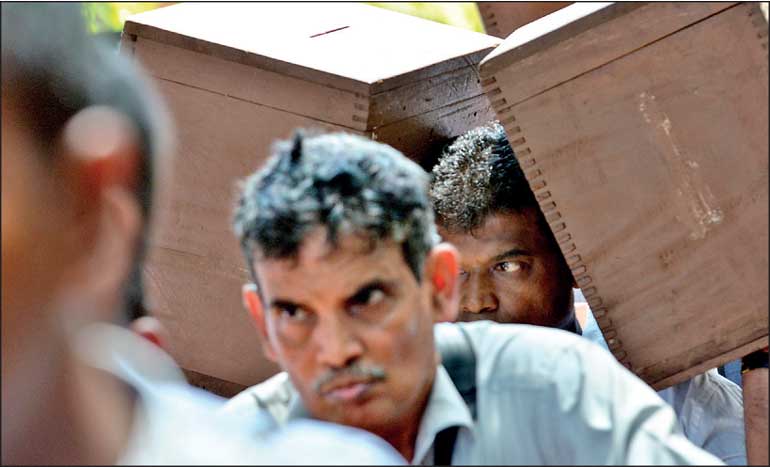Monday Feb 16, 2026
Monday Feb 16, 2026
Saturday, 7 September 2024 00:10 - - {{hitsCtrl.values.hits}}

No manifesto which disregards or does not pay any heed to the public finance and fiscal policy of the country should be taken seriously by the voters and should be consigned to the dustbin – Pic by Shehan Gunasekara
The important message is that manifesto pledges which are released for public consumption drafted haphazardly, with either no connection with the ongoing policies or formulated distanced from the realities of prevailing economic levels, should be taken with a pinch of salt. They are gross exaggerations or mere balderdash
 These days we are seeing beautiful presentations of election manifestos issued by Presidential candidates released one after the other. There is no doubt that all these are designed best, to cajole the voters and convince them to win their support. Almost all these documents are loaded with stunning promises to seduce the voters to believe their vows.
These days we are seeing beautiful presentations of election manifestos issued by Presidential candidates released one after the other. There is no doubt that all these are designed best, to cajole the voters and convince them to win their support. Almost all these documents are loaded with stunning promises to seduce the voters to believe their vows.
A major focus of the manifestos this time is on the highlighted clamour for bringing about a change. A complete change at that, as some tend to make it appear. This is an appealing slogan that seems to induce many easily. The Campaign Masters who guide and advise the parties and the candidates are well aware how marketable it is, and easily grabbed by the unsuspecting citizens as the underlying perception is cherished and favoured by all human beings. It is a normal human phenomenon to look forward to something better than what they have.
In a deceptive casualness most candidates have chosen this dictum as their major slogan in their campaigns to lure the voter population. Since it is a fraud contemplated on the gullible public capitalising on their innocent speculation, it is worth looking at it in a more incisive sense.
When someone thinks of changing into a new situation his immediate concern is the current relevant scenario. In other words, a change from the current to a better future. So, the current status becomes a relevant crucial factor. The insatiable curiosity driving the human mind to look for the better, re-kindles this desire and appetite.
People living filled with the hope of a better tomorrow easily fall prey to the trick of creating a greener pasture. They tend to forget how they came to the current status and from what state they emerged to come there. Considering the economic disaster, we all were confronted with two years back, we have to give serious thought to the projected expectation of achieving a rosy change immediately following an electoral victory unless in the context of someone holding the reins which can be released as desired, to bring about the promised utopia where the Government is capable of producing everything as professed. It is a common thing to be seen anywhere for the belligerent groups to articulate such compelling assertions which are bound to vaporise into thin air in the most unlikely event of a success by such groups. Such groups dare not fear to spell out their imaginary visions on issues ignored by major parties. “Fools rush in where angels fear to tread”.
Keeping with the realities of the status quo
The incumbent governing party on the contrary will have to concentrate on their plans to further improve the quality of life of the nation in keeping with the realities of the status quo. It is they who possess the information, and statistical data which they have utilised in policymaking. They would be in a better position to know and assess the availability of funding and also the ability to ascertain their workability. It is very unlikely for any responsible government in power to make expensive commitments however attractive such would be to the citizens. So, for the governing party the election manifesto would be a platform only to emphasise their policies in office. They will therefore have to exercise caution with their manifestos while demonstrating their plans are already working.
The important message is that manifesto pledges which are released for public consumption drafted haphazardly, with either no connection with the ongoing policies or formulated distanced from the realities of prevailing economic levels, should be taken with a pinch of salt. They are gross exaggerations or mere balderdash.
In a situation like this it is best to project the present into the future as it visually displays the success story of moving away progressively from the economic bliss we were engrossed in.
Let us also take a look at the widely spreading plague of the “Change Syndrome.” Our political history has many examples to contemplate in this regard. In retrospect we note how some players in the political arena today have been rapidly changing in the past. It is like a never ending metamorphosis. Beginning as eggs, hatched into tadpoles, growing as toadlets, and then becoming grown up toads/frogs. But the process never ends because the toads again lay eggs which have to go through the previous process. They are locked up in a vicious circle, ending to begin again in the same circle.
We saw the emergence of a clandestine group evolving into an insurgency. They displayed and portrayed a new political culture of breaking away from the democratic process and projecting a revolutionary change in politics. They took up petrol bombs and shotguns in place of the ballot paper.
In their preparatory role they enunciated many new doctrines. Tea plantations were thought of as anti-domestic and invasionary intrusions by the colonial regimes. They advocated a theory of uprooting tea plantations and growing manioc instead. When the Jayewardene regime started the tourism development and commenced the Bentota Hotel project, we heard these Luddites openly denouncing the exercise by alleging it is an attempt to build spy towers for the Americans in our soil. They failed in a coup attempt to take over the legally elected Government of the people in the 1970s. After they were freed from jail they chose to come into the democratic process and contested the 1982 Presidency elections.
But this change was again reversed into a widespread clandestine movement culminating in the assassinating of trade union leaders, Government officials, innocent supporters of political parties in villages, artists, writers, intellectuals, university professors, Buddhist monks and so on. Virtually attempting to create an anarchy in the country. When it was suppressed, the movement reverted to democratic politics contesting free elections and entering the fray among other political parties.
But not for long; again the undemocratic acts in the presidential election period of the 1980s. The normal democratic process was subdued due to a threat by them to shoot the first 10 voters in the queue at the Presidential polling. Now the change is much better due to endorsing the international role in the globalised economy. A very sharp change is displayed in tolerating the international organisations such as the World Bank, IMF, ADB, etc. as useful agencies needed to carry on the governance.
But most of the other contenders have not undergone such far-reaching extreme radical changes. They only contemplate changing the living standards to a very high level on par with fully developed nations and grant tax free regimes and high salaries and wages, social assistance schemes of unprecedented standards, immediately after their victory.
There is also a new economic order branded as an entrepreneur regime guaranteeing the introduction of an income generation business opportunity to every citizen! A State endorsing entrepreneurship for all.
Any sustainable change for the better is good.
No ideological direction
However most of these contemplated changes are without any sense of an ideological direction. E.g. all manifestos have hypocritically maintained their silence about the need to establish an active, high performing, Public Service for the country which from any stand point is a vital critical requirement.
Today, a highly corrupt inefficient and lethargic, outdated Public Service, which stands as the biggest impediment to development is totally ignored from the purview of this imminent need of being revamped due to the fear of losing a significant percentage of their votes anticipated from this sector. They have instead proposed attractive financial benefit packages to the Public Sector despite the financial constraints standing as realistic barriers against such promises.
Manifestos therefore, tend to lose the importance they ought to be attributed. If they remain as mere campaign documents without any meaningful contribution to the policy making process of the country, they will not be worth the paper of such publications. No manifesto which disregards or does not pay any heed to the public finance and fiscal policy of the country should be taken seriously by the voters and should be consigned to the dustbin.
Election manifestos are inevitably a letdown according to Patric Diamond, professor in Public Policy in the School of Politics and International Relations at Queen Mary University of London. He wrote on the inevitable letdown of election manifestos – and how to fix them. Gratefully acknowledged by the writer.